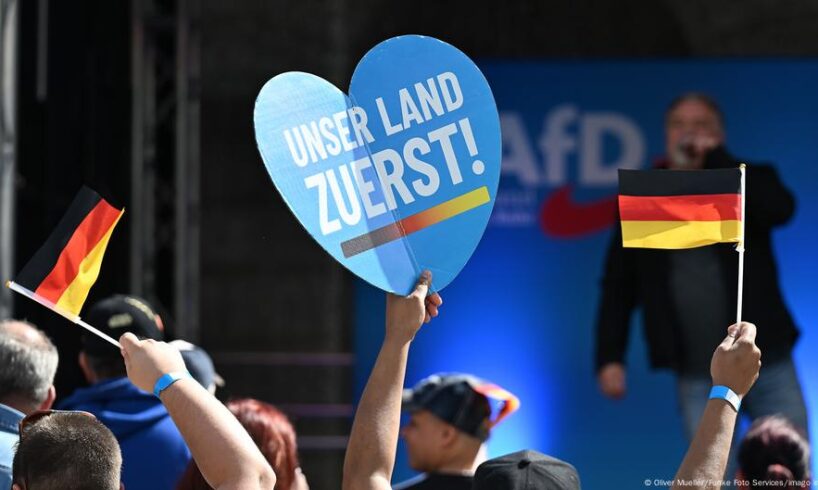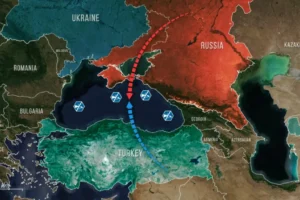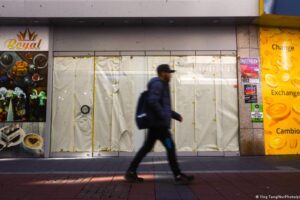
On Sunday, around 13.7 million people went to the polls in Germany’s most populous state, North Rhine-Westphalia. The results were losses for the center-left Social Democrats (SPD) and a bitter blow for the environmentalist Greens.
The conservative Christian Democratic Union (CDU) saw a respectable showing, but it was the partly right-wing extremist Alternative for Germany (AfD) that made the strongest gains.
At stake in the local elections were around 20,000 parliamentary seats in almost 400 towns and municipalities, as well as mayorships in larger cities.
AfD: Vote in western state ‘a referendum on the direction of our country’
The election had no direct consequences for the federal government in Berlin, but it was the first important test of public opinion after the new coalition took power on May 6.
According to preliminary state results, the CDU received the most votes with 33.3%. The SPD followed with 22.1%, the AfD with 14.5% and the Greens with 13.5%. The AfD also overtook the Greens in North Rhine-Westphalia in the federal election that took place last February.
The clear losers were the Greens, who lost a significant share of the vote, while the AfD almost tripled its result from five years ago, making them the winner in terms of percentage gains.
The AfD’s state leader, Martin Vincentz, said on Sunday: “It was a referendum on the direction of our country. And those who ignore the will of the voters will be punished by the voters.”
What has changed in Germany since 2020?
However, comparisons with the 2020 local elections are not necessarily useful for evaluating the results. In 2020, Germany was in the midst of the COVID-19 pandemic, and the AfD was nowhere near as popular across the country as it is now.
In the years that followed, the people of North Rhine-Westphalia first saw the collapse of a federal government made up of SPD, Greens, and the neoliberal Free Democrats (FDP) after a bitter dispute that cost all three parties a great deal of support.
At the time, housing shortages, domestic security and asylum policy were already important issues, but not as dominant as they are now. And in 2020, the war in Ukraine had not yet broken out, nor had violence escalated in the Middle East.
In other words, many of the issues that are causing uncertainty among German citizens today did not exist in 2020. The effects of the catastrophic flooding that took place in the Ahr Valley, part of which is in North Rhine-Westphalia, in July 2021 — which took 135 lives and caused massive destruction in the region — are still being felt, a situation that the AfD was also able to capitalize on.
State’s leader Wüst: ‘We cannot rest easy’
The state’s minister president, Hendrik Wüst of the CDU, voiced his concerns about the election results. “This result must give us pause for thought; it means we cannot rest easy. Not even my party, which won the election so decisively,” he said.
Wüst then went on to pose questions that, in his view, follow from the election results: “What are the right answers when it comes to poverty and migration? Are all parts of our social system truly fair?”
Essentially, Wüst believes that the AfD’s strong showing is above all a protest vote. He himself has been governing the state since October 2021 and was not up for election on Sunday.
The new federal government in Berlin, made up of CDU, its Bavarian sister party the Christian Social Union (CSU) and the SPD, quickly lost popularity after Friedrich Merz (CDU) was elected as the new chancellor in May.
The election in the North Rhine-Westphalia municipalities was especially significant for Merz, as he hails from the German state bordering the Netherlands and Belgium.
Elections in Germany’s most populous state test Merz’s rule
To view this video please enable JavaScript, and consider upgrading to a web browser that supports HTML5 video
The chancellor had expected to see the AfD perform well. “Tomorrow evening and on Monday, I will sit down and take a good look at the results, and then draw conclusions about how best to run election campaigns and address issues,” he said last week, during a visit to the Henkel factory in Düsseldorf.
Merz announced that he would “fight very hard on the issues, to ensure that the right topics are addressed and that the country stays on course.”
AfD performs well in former SPD stronghold
Beyond the state election in North Rhine-Westphalia, municipal elections in cities such as Gelsenkirchen have also garnered unsual levels of attention.
In Gelsenkirchen, a city characterized by dilapidated infrastructure, high unemployment, and a large immigrant population, the AfD won more second votes than any other party in the federal elections in February.
For many decades before that, the city in the heart of the Ruhr region had been an SPD stronghold. Now, just like in nearby Duisburg, a runoff election looms between SPD and AfD candidates.
This article has been translated from German.
While you’re here: Every Tuesday, DW editors round up what is happening in German politics and society. You can sign up here for the weekly email newsletter, Berlin Briefing.





